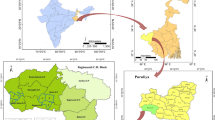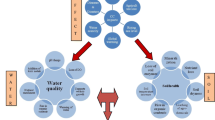Abstract
A major shortcoming of Participatory Irrigation Management and Irrigation Management Transfer (PIM/IMT) is the absence of Monitoring & Evaluation (M&E) systems that accompany these processes and become a major instrument to correct, improve and learn. Although at the global level some countries have exerted efforts to implement M&E systems, these still present limitations, as the review of the international experiences shows. The Mediterranean situation is even more dramatic since only Tunisia implements an M&E system, whereas Egypt has shyly moved in this direction with a limited practical application. This state of affairs led the authors to develop a set of guiding principles to develop an M&E system to be applied in countries where PIM/IMT is adopted. This paper revises the main international efforts devoted to assess the performance of PIM/IMT and the state of the art of these processes in Southern and Eastern Mediterranean Countries. Moreover, it sets the framework and analyses the main sustaining factors for the development of a new M&E system for these countries.
Similar content being viewed by others
Notes
Following formal EC decision, in spring 2012 activities have been stalled in Syria while Libya has officially become a Partner Country of the SWIM Program.
References
Garces-Restrepo C, Vermillion D, Muñoz G (2007) Irrigation management transfer - worldwide efforts and results. FAO water reports no. 32. Rome, Italy
Hatcho N, Tsutsui H (1998) World irrigation (IX): irrigation management transfer and participatory irrigation management. Rural environ. Eng 35(8):5–14
Kusek J, Rist R (2004) Ten steps to a results-based monitoring and evaluation system. World Bank, Washington, D.C.
Lamaddalena N, Khadra R (2012) Regional assessment - water users’ associations in the Partner countries (Algeria; Egypt; Israel; Jordan; Lebanon; occupied Palestinian territory; Morocco; Syria; Tunisia) of the sustainable water integrated management - support mechanism (SWIM-SM) EU project
Meinzen-Dick R (2007) Beyond panaceas in water institutions. Proc Natl Acad Sci 104(39):15200–15206
Mollinga PP, Bolding A (2004) The politics of irrigation reform: contested policy formulation and implementation in Asia, Africa and Latin America. Ashgate, England
Morra Imas LG, Rist RC (2009) The road to results: designing and conducting effective development evaluations. World Bank. © World Bank. https://openknowledge.Worldbank.Org/handle/10986/2699 license: CC BY 3.0 IGO
O’Flynn M (2010) Impact assessment: understanding and assessing our contributions to change © INTRAC
Peter RJ (2004) Participatory irrigation management, INWEPF/SY/2004 international network on participatory irrigation management. Washington, DC
Rap E (2006) The success of a policy model: irrigation management transfer in Mexico. J Dev Stud 42(8):1301–1324
Roche C (1999) Impact assessment for development agencies. Oxfam GB, Oxford
Sagardoy JA, Taha S (2013) Analysis of the responses to the questionnaires/checklists on the availability of data for the M&E of PIM/IMT programs in the SWIM project countries. SWIM-SM project. Downloadable at the SWIM-SM web site
Senanayake N, Aditi Mukherji A, Giordano M (2014) re-visiting what we know about irrigation management transfer: a review of the evidence. AGR Water Manage 149(2015) 175–186
Suhardiman D, Giordano M, Rap E, Wegerich K (2014) Bureaucratic reform in irrigation: a review of four case studies. Water Alternatives 7(3):442–463
Suhardiman D (2013) The power to resist: irrigation management transfer in Indonesia. Water Alternatives 6(1):25–41
Suhardiman D (2008) Bureaucratic designs: The paradox of irrigation management transfer in Indonesia. PhD thesis, Wageningen University
Van Vuren G, Papin C, Haourari El N (2004) Participatory irrigation management: comparing theory with practice a case study of the Beni Amir irrigation scheme in Morocco. Actes du Séminaire Modernisation de l’Agriculture Irriguée, Rabat, In, pp 19–23
Vermillion D, Sagardoy JA (1999) Transfer of irrigation management services-guidelines. FAO irrigation and drainage paper no. 58. Rome, Italy
Weisbrod G, Weisbrod B (1997) Measuring economic impacts of projects and programs. Economic Development Research Group, Boston
WK Kellogg Foundation (2004) Logic Model Development Guide. W.K. Kellogg Foundation, Battle Creek, Michigan
World Bank (2012) Designing a results framework for achieving results: a how-to guide. The World Bank, Washington DC
Acknowledgements
This paper is based on the studies conducted under the framework of the activities undertaken within the EU project Sustainable Water Integrated Management (SWIM) - Support Mechanism (SM) from 2011 to 2015.
Author information
Authors and Affiliations
Corresponding author
Rights and permissions
About this article
Cite this article
Khadra, R., Sagardoy, J.A., Taha, S. et al. Participatory Irrigation Management and Transfer: Setting the Guiding Principles for a Sustaining Monitoring & Evaluation System – a Focus on the Mediterranean. Water Resour Manage 31, 4227–4238 (2017). https://doi.org/10.1007/s11269-017-1741-3
Received:
Accepted:
Published:
Issue Date:
DOI: https://doi.org/10.1007/s11269-017-1741-3




